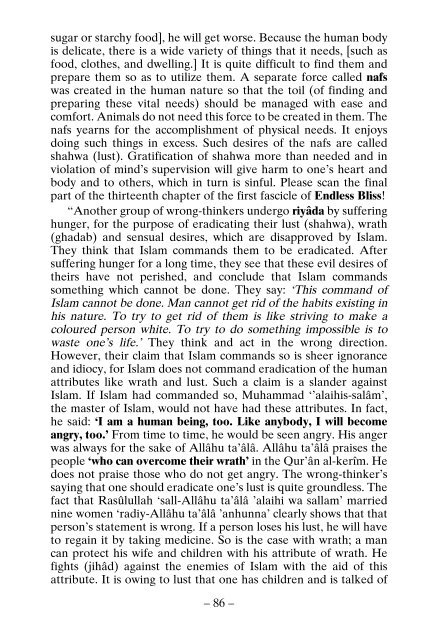Belief and Islam
BELIEF AND ISLAM star This work, Belief and Islam, originally was written in Persian under the title I’tiqâd-nâma by Hadrât Mawlânâ Khâlid al-Baghdâdî, a profound ‘âlim of Islam and a specialist in ma’ârif of tasawwuf. Hâji Faydullah Effendi of Kemah, a khalîfa of great walî Mavlânâ Mahmûd Sâhib, the brother of the author, translated the book into Turkish and named it Farâid-ul-fawâid which was printed in Istanbul in 1312 A.H.[1894]. Our bookstore had it translated again from the Persian original into Turkish and, some explanations and three chapters, published it with the title Imân ve Islâm in 1966. German, French and Arabic versions are also published by our bookstore. This book, explains five fundamentals of Islam, six fundamentals of îmân and the contemporary information about the matter and refutes those who are against Islam and those who are lâ-madbhabî.
BELIEF AND ISLAM
star This work, Belief and Islam, originally was written in Persian under the title I’tiqâd-nâma by Hadrât Mawlânâ Khâlid al-Baghdâdî, a profound ‘âlim of Islam and a specialist in ma’ârif of tasawwuf. Hâji Faydullah Effendi of Kemah, a khalîfa of great walî Mavlânâ Mahmûd Sâhib, the brother of the author, translated the book into Turkish and named it Farâid-ul-fawâid which was printed in Istanbul in 1312 A.H.[1894]. Our bookstore had it translated again from the Persian original into Turkish and, some explanations and three chapters, published it with the title Imân ve Islâm in 1966. German, French and Arabic versions are also published by our bookstore. This book, explains five fundamentals of Islam, six fundamentals of îmân and the contemporary information about the matter and refutes those who are against Islam and those who are lâ-madbhabî.
Create successful ePaper yourself
Turn your PDF publications into a flip-book with our unique Google optimized e-Paper software.
sugar or starchy food], he will get worse. Because the human body<br />
is delicate, there is a wide variety of things that it needs, [such as<br />
food, clothes, <strong>and</strong> dwelling.] It is quite difficult to find them <strong>and</strong><br />
prepare them so as to utilize them. A separate force called nafs<br />
was created in the human nature so that the toil (of finding <strong>and</strong><br />
preparing these vital needs) should be managed with ease <strong>and</strong><br />
comfort. Animals do not need this force to be created in them. The<br />
nafs yearns for the accomplishment of physical needs. It enjoys<br />
doing such things in excess. Such desires of the nafs are called<br />
shahwa (lust). Gratification of shahwa more than needed <strong>and</strong> in<br />
violation of mind’s supervision will give harm to one’s heart <strong>and</strong><br />
body <strong>and</strong> to others, which in turn is sinful. Please scan the final<br />
part of the thirteenth chapter of the first fascicle of Endless Bliss!<br />
“Another group of wrong-thinkers undergo riyâda by suffering<br />
hunger, for the purpose of eradicating their lust (shahwa), wrath<br />
(ghadab) <strong>and</strong> sensual desires, which are disapproved by <strong>Islam</strong>.<br />
They think that <strong>Islam</strong> comm<strong>and</strong>s them to be eradicated. After<br />
suffering hunger for a long time, they see that these evil desires of<br />
theirs have not perished, <strong>and</strong> conclude that <strong>Islam</strong> comm<strong>and</strong>s<br />
something which cannot be done. They say: ‘This comm<strong>and</strong> of<br />
<strong>Islam</strong> cannot be done. Man cannot get rid of the habits existing in<br />
his nature. To try to get rid of them is like striving to make a<br />
coloured person white. To try to do something impossible is to<br />
waste one’s life.’ They think <strong>and</strong> act in the wrong direction.<br />
However, their claim that <strong>Islam</strong> comm<strong>and</strong>s so is sheer ignorance<br />
<strong>and</strong> idiocy, for <strong>Islam</strong> does not comm<strong>and</strong> eradication of the human<br />
attributes like wrath <strong>and</strong> lust. Such a claim is a sl<strong>and</strong>er against<br />
<strong>Islam</strong>. If <strong>Islam</strong> had comm<strong>and</strong>ed so, Muhammad ‘’alaihis-salâm’,<br />
the master of <strong>Islam</strong>, would not have had these attributes. In fact,<br />
he said: ‘I am a human being, too. Like anybody, I will become<br />
angry, too.’ From time to time, he would be seen angry. His anger<br />
was always for the sake of Allâhu ta’âlâ. Allâhu ta’âlâ praises the<br />
people ‘who can overcome their wrath’ in the Qur’ân al-kerîm. He<br />
does not praise those who do not get angry. The wrong-thinker’s<br />
saying that one should eradicate one’s lust is quite groundless. The<br />
fact that Rasûlullah ‘sall-Allâhu ta’âlâ ’alaihi wa sallam’ married<br />
nine women ‘radiy-Allâhu ta’âlâ ’anhunna’ clearly shows that that<br />
person’s statement is wrong. If a person loses his lust, he will have<br />
to regain it by taking medicine. So is the case with wrath; a man<br />
can protect his wife <strong>and</strong> children with his attribute of wrath. He<br />
fights (jihâd) against the enemies of <strong>Islam</strong> with the aid of this<br />
attribute. It is owing to lust that one has children <strong>and</strong> is talked of<br />
– 86 –

















